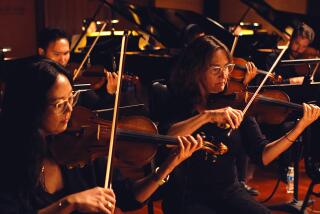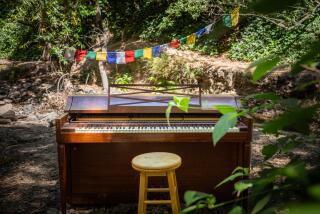An Ivories Power : Retiring Tuner for Schools Says Good Ear Is Key to His Piano Forte
- Share via
Ernest A. Cofield, 56, has had a passion for music since youth. When he was 16, he learned to play the piano. He attended music classes at San Diego City College. When he was stationed in Guam for a year during his Army service, he taught himself to play the organ because humidity on the island made it impossible to maintain a piano.
But his eventual occupation as a piano tuner--the only one employed by the San Diego Unified School District--came circuitously.
“I was going to be a dentist,” he said.
While he went to college, Cofield worked nights for the school district as a custodian. He took a leave of absence for two years when he was in the Army, and when he returned worked for the district as a bus driver for handicapped students.
Cofield then befriended a piano tuner who encouraged him to attend a school of piano technology in Sacramento.
For the year it took him to get his certificate, Cofield worked during the week in San Diego, commuting by car to and from Sacramento on weekends and during school breaks, staying with with his sister and brother-in-law in Sacramento. It was possible to do much of his schoolwork during his spare time because most of it involved shop work, he said.
It would be 20 years before Cofield became the piano tuner for the school district, but he started tuning pianos privately in 1958. In 1978, he took over as the man who tunes and maintains the nearly 1,000 pianos throughout the school district.
Cofield has put in his time--he’s been with the district in one capacity or another for nearly 40 years and done more than 13,000 tunings--and now he feels it’s time to move on.
“My first impression when I heard he was retiring was that he’s probably the best maintenance employee I’ve seen here,” said supervisor Wallace Woehler. “He never complains, just goes about his work . . . a fine gentleman, too.”
Cofield was recently given a special award by his colleagues for his dedication and longevity, and because “he’s gone out of his way to do a little over and above the call of duty,” Woehler said.
For instance, Woehler said, Cofield periodically shows classes how he tunes pianos and how the 3,000 or so parts in a piano work. Cofield is proud of the schools’ musical programs and is dismayed by the budget cuts that have eaten into them.
He is convinced that when he retires, he won’t be replaced.
Yearly Tunings
Nowadays, Cofield manages to tune each piano in the district about once a year--they should be tuned three times that often, he said, “and when I’m gone, they’re going to go longer than that.”
School officials say they have not decided whether they will replace Cofield when he retires next year. They say it is too early to speculate whether it will be cheaper to replace Cofield with another full-time piano tuner or whether they will contract out the work, but Cofield points to recent cuts in elementary schools’ music programs as evidence that the district is less committed to music in general.
“If they’re not going to have the programs, they don’t need a tuner,” he said.
Cofield, a soft-spoken man, takes pride in his craft. He is not so optimistic, however, about the future of piano tuning. In general, he said, piano tuning is declining, although pianos still sell well.
“It’s like the watchmakers,” he said. “It is going down.”
One reason for the decline, Cofield said, is that “the youngsters don’t like it because it takes a lot of patience.” It takes at least 90 minutes of intense concentration to tune a piano, and it often takes longer if the piano hasn’t been tuned in a long time.
The use of electronic keyboards has also been a factor, Cofield said, as has piano owners’ reluctance to get the instruments tuned regularly.
“We have to educate the people to tune their pianos more often. The manufacturers used to (promise) that once you take a piano out of the store, it never goes out of tune,” he said. It costs between $40 and $50 to have a piano tuned.
When he tunes a piano, he depends mostly on his ears, instead of electronic tools used by some tuners. Though he generally disdains relying on electronic tuners, he said they do sometimes serve a purpose.
“It depends on how much you’re going to use it. I think it’s fine for some things . . . because it speeds up your work. But to tune completely (with electronic tuners)--I think it’s too pure. Each piano has its own characteristics. They’re all different. There’s no two pianos alike, so tuning those pianos is different.”
Ear Is Key
The ear, Cofield said, is the key. It also helps to have absolute silence when tuning, and that’s difficult to find with schoolchildren nearby.
“They usually leave me alone when I’m tuning, but sometimes they’ll be playing in a room next door. That’s why I had to develop a keen ear,” Cofield said. “Some technicians can’t do it. They have to have it perfectly quiet.”
Cofield lives in Southeast San Diego with his wife and and has 10 children, ages 14 through 26. Though he has tried to inspire his children to have strong musical interests, only one of them, his daughter Janet, plays piano.
After he retires, Cofield plans to travel, work on his train set and continue as the organist for the Calvary Baptist Church, where he has played since 1965. But he will still tune pianos privately for clients he has built up over the years.
“I’ll tune until I’m not able to do it anymore,” he said. “I’m not the type to just sit around.”
More to Read
Sign up for Essential California
The most important California stories and recommendations in your inbox every morning.
You may occasionally receive promotional content from the Los Angeles Times.












